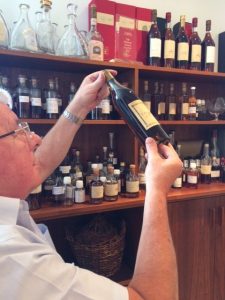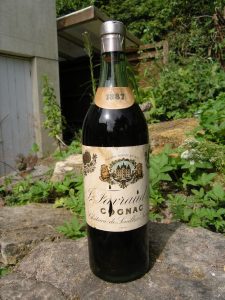Brandy Bottle Valuation
 We often have requests to do a Brandy Bottle Valuation and whilst sometimes a bottle can have a high value, most brandy valuations will disappoint most people.
We often have requests to do a Brandy Bottle Valuation and whilst sometimes a bottle can have a high value, most brandy valuations will disappoint most people.
The term brandy is generic and covers any alcoholic drink reduced or distilled from a fruit. This includes Spanish brandies, grappa, marc and grape brandy (which can be used for semi-production purposes, for example fortifying port or sherry). This group of brandies will usually include the name brandy on the bottle but by law cannot include the names armagnac, calvados or cognac. If no identifying descriptions appear on the label we can assume it is a grape brandy which is not controlled by an authority and has minimal value.
The main French brandies have tight controls on their production and storage. For this reason, we know that if a bottle is labelled cognac, armagnac or calvados it will have been produced and aged in the approved manner.
Cognac ageing to its optimum quality in oak casks can take many years. In the case of cognacs from the top crus this can be up to 90 years. Armagnacs and calvados take rather less time. The requirement for this long barrel ageing increases its cost of production and therefore value. New oak casks cost around 700 euros each and storing the older casks, used for extensive ageing, requires sizeable, quality cellars. On the other hand, grape brandies may only be aged for a year and heavily diluted with water. Consequently, even quite good grape brandies only cost a couple of euros per litre to produce.

A highly valued cognac, armagnac or calvados will have one of these appellations named on the label together with an age statement or vintage. The level of the brandy in the bottle, the quality of the seal, the shape, size and type of bottle, the colour and the clarity of the spirit are also important. Then of course there is the name of the producer or negoçiant and the region where the brandy was produced. Much information about its value can be gained by knowing how it was distilled, the quality of the strata and sub-strata as well as the cellar in which it was aged. If the bottle owner can provide a provenance for it, that also helps.
If, on the other hand, your old bottle of brandy that has been stored for the last 50 years, does not mention cognac, armagnac or calvados on the label and does not provide an age statement of any sort, I am afraid that your bottle will be virtually worthless. It is also worth noting that retail values of old brandies are more than twice the trade or auction values since it can take many years to sell even a top quality bottle of fine cognac.
If you have a bottle of brandy that you would like valued, please refer to our Valuation Service which can be found on the home page of our website.
